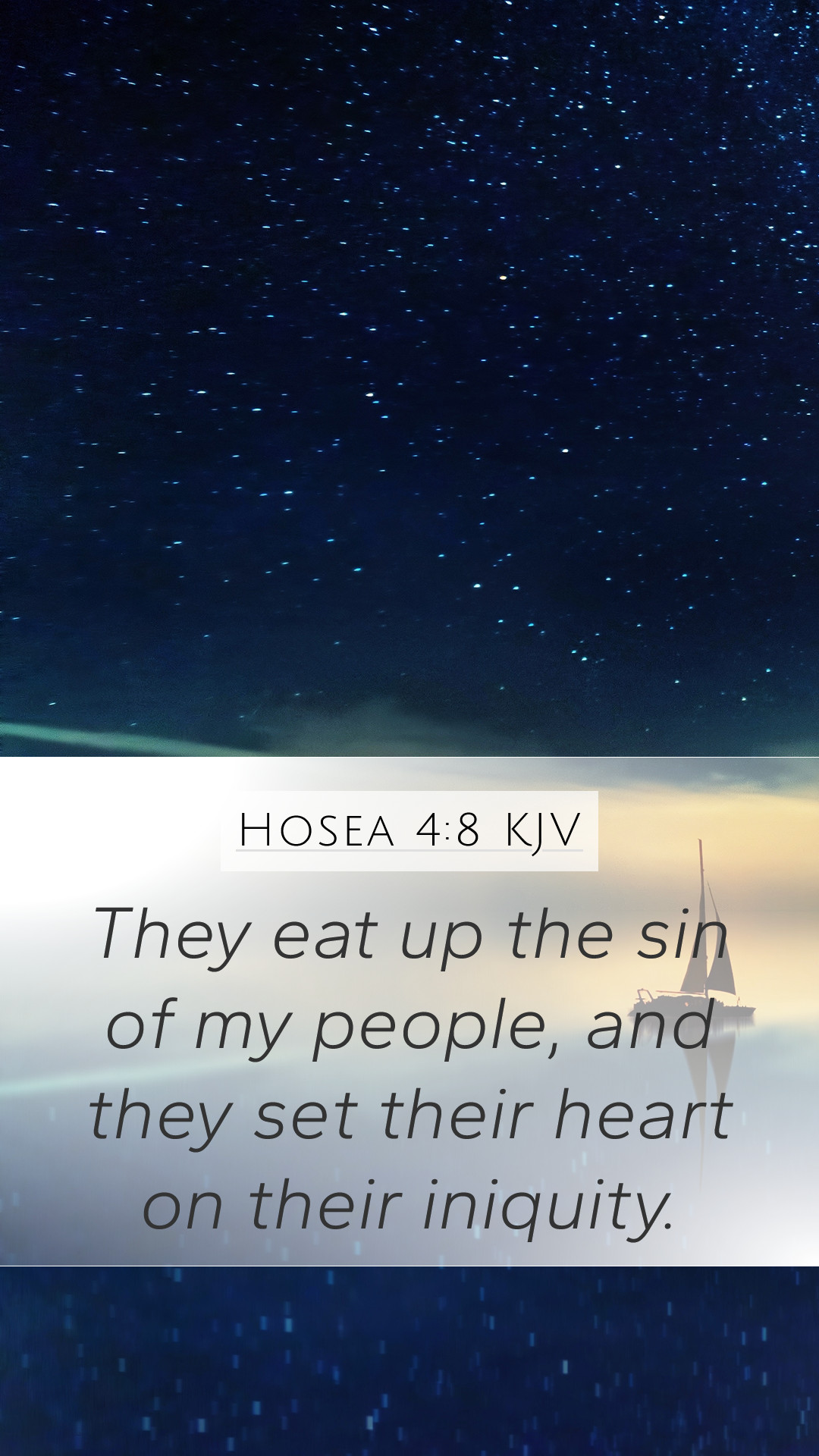Old Testament
Genesis Exodus Leviticus Numbers Deuteronomy Joshua Judges Ruth 1 Samuel 2 Samuel 1 Kings 2 Kings 1 Chronicles 2 Chronicles Ezra Nehemiah Esther Job Psalms Proverbs Ecclesiastes Song of Solomon Isaiah Jeremiah Lamentations Ezekiel Daniel Hosea Joel Amos Obadiah Jonah Micah Nahum Habakkuk Zephaniah Haggai Zechariah MalachiHosea 4:8 Meaning
What is the meaning of Hosea 4:8?
They eat up the sin of my people, and they set their heart on their iniquity.
Hosea 4:8 Bible Verse Meaning
Understanding Hosea 4:8
The verse Hosea 4:8 states, "They eat up the sin of my people, and they set their heart on their iniquity."
In this powerful passage, we find a vivid depiction of the corrupt practices among Israel's priests and leaders. This verse addresses both the spiritual and moral decline witnessed in the nation, highlighting the serious consequences that arise from their actions. Let's explore various insights from respected public domain commentaries to provide a thorough understanding of this verse.
Bible Verse Meanings
The essence of Hosea 4:8 reveals a critical reflection on the role of Israel's spiritual leaders. The term "sin of my people" implies that the leaders not only fail to call the people to repentance but also profit from their transgressions.
Bible Verse Interpretations
- Matthew Henry: Henry notes that the priests, instead of guiding the people towards a righteous life, are implicated in perpetuating their wrongdoing. They are more interested in their gain than the welfare of the community.
- Albert Barnes: Barnes expands on the idea that such leaders feed on the sins of the people, revealing their greedy desires and moral bankruptcy. The leaders' focus on material gain leads to greater societal decay.
- Adam Clarke: Clarke emphasizes the term “set their heart on their iniquity,” indicating a deep-rooted intention. Their hearts are not just focused on sin; they are actively engaged in a lifestyle that promotes and profits from immorality.
Bible Verse Understanding
This verse serves as a grave warning about the state of spiritual leadership. The leaders' betrayal not only harms their credibility but also leads the people astray. The implication is that their actions contribute to a cycle of sin that engulfs the entire nation.
Bible Verse Explanations
Hosea 4:8 invites readers to reflect on the broader themes of accountability among leaders and the dangers of moral compromise. It highlights the relationship between the spiritual responsibilities of those in power and the resulting state of society.
Biblical Exegesis
Through this exegetical approach, we uncover that God’s message, as articulated through Hosea, calls for a return to integrity and holiness. The condemnation of Israel’s leaders not only illustrates their failure but serves as an admonition for contemporary believers.
Application of Hosea 4:8
In applying this verse to modern life, it encourages individuals, especially those in positions of leadership, to reflect on their influence on others. It reminds us that failing to uphold God’s standards carries weighty consequences, not just for ourselves but for our communities.
Bible Cross References
- Hosea 6:6 - The importance of mercy and knowledge over burnt offerings.
- Malachi 2:7 - The role of priests in preserving knowledge and instructing the people.
- Isaiah 56:10-11 - A scathing report on negligent watchmen who prioritize personal gain.
Conclusion
Hosea 4:8 stands as a poignant reminder of the ethical responsibilities borne by spiritual leaders and the impact of their actions on the community's moral compass. Through careful study and analysis, we can glean valuable lessons on integrity, accountability, and the pursuit of righteousness in our own lives.


